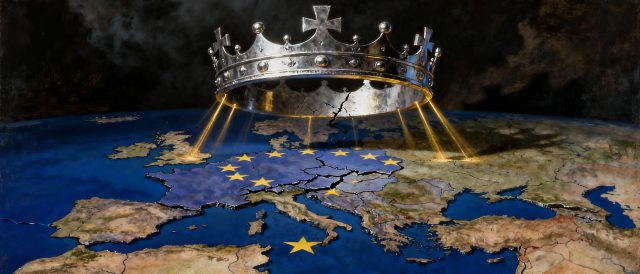
In an impromptu interview that I made in Romania’s Palace of the Parliament, after the debate organized by AUR party ended with thunderous applause, Jarosław Lindenberg, the former Under-Secretary of State in Poland’s Ministry of Foreign Affairs, made a highly provocative argument: the European Union’s current trajectory is no longer a democracy, it’s the slow dismantling of national sovereignty, and reform is no longer viable.
Lindenberg’s credentials command attention. The distinguished diplomat spent decades building bridges across Eastern Europe, establishing embassies in the newly independent Baltic states and Montenegro, serving as ambassador to Bulgaria and Bosnia, and overseeing Poland’s diplomatic apparatus until late 2023. Yet these decades of institutional service have led him to a radical conclusion: “I do not believe in reforms,” he states bluntly. “Either we dissolve it or it will become a real superstate.”
It’s a diagnosis rooted in historical comparison. Lindenberg draws a striking parallel to the Soviet Union, a system he witnessed firsthand as a man born under communism. “I remember when we were talking, during my students time and later under martial law imposed by general in Poland, about the dissolution of communist bloc. It was like dreaming about working on Mars or other planets. Nobody believed it would happen during our life. But it happened sooner than we expected,” he recalls. Yet what gave him hope then troubles him now: the EU, he argues, is replicating the same structural flaws that doomed communism.
The core of his concern is centralization. While the United States represents genuine federalism with reasonable division of competences between Washington and the states, the EU has pursued relentless centralization. “The more member states are within the European Union, the more centralized it is, and the less competences are left within the competence of the Member States,” Lindenberg explains. Most ominously, he warns that the Spinelli Group’s proposed constitutional changes will transform the EU into an even more centralized superstate if implemented.
But here’s where Lindenberg’s argument becomes almost cultural: Europe, he insists, is fundamentally unlike America. “All these states of America have the same history. People speak the same language and they share the same values. Whereas in Europe, we have nations that were formed during a long lasting process. Every nation has its own language, own culture, own tradition and these all traditions, cultures, languages are individual and cannot be repeated,” he emphasizes.
To build a European superstate would require erasing these distinctions entirely. “It means to abolish the sovereignty of national nation states and transform the people living for centuries according to their own culture, to their own tradition, into new European nation. Homogeneous,” he explains. This experiment, he argues, was already attempted. “The same experiments were conducted during the time of the Soviet Union. Of course it failed.”
The evidence, Lindenberg suggests, is everywhere. Spain battles Catalonian independence movements. Belgium faces Flemish tensions. Scotland seeks autonomy from Britain. Even Poland has whispers of Silesian autonomy. These aren’t anomalies, they’re symptoms of a natural human instinct that centralized power cannot suppress. “The process of centralization and depriving of the nations step by step their sovereignty is against the natural feelings and natural and essential interest of nations and of the people,” he argues.
Yet Lindenberg sees economic collapse as the true crisis point. The EU’s “climate madness,” Green Deal, and uncontrolled migration policies, he predicts, will trigger the system’s failure. Just as economic catastrophe, not politics, finally broke communism. “The same is going with the European Union. These typically ideological ideas that had nothing to do with real economic interest will lead us to poverty and then to the economic and social collapse,” he warns.
When I asked him whether crisis narratives, from COVID to war threats, will permanently work to consolidate power, Lindenberg offers cautious skepticism. “You can threaten people with Russian attack, with the new virus, etc., but we cannot convince them that if they become more poor because of economic catastrophic policies led by European Union, we cannot convince them that they become richer. Everybody knows how much money is in his wallet,” he says with blunt realism.
His message to Europe’s conservative forces is urgent: Unite now to stop the transformation, then revert the process, “to come back to the Europe of sovereign nations, independent sovereign nations, that could cooperate and should cooperate. But on the voluntary basis.”
Whether one agrees or not, Lindenberg’s argument deserves serious engagement. It’s the sophisticated case for the EU’s dissolution coming from someone who spent his career building European institutions, a man who knows them intimately enough to warn us all.



 Subscribe
Subscribe